Top 9 University of Nepal


The University of Nepal is a national university system in Nepal that comprises 9 universities and multiple affiliated colleges. It consist the largest and oldest university system in the country, offering undergraduate and postgraduate programs in various fields of study.
1. Tribhuvan University
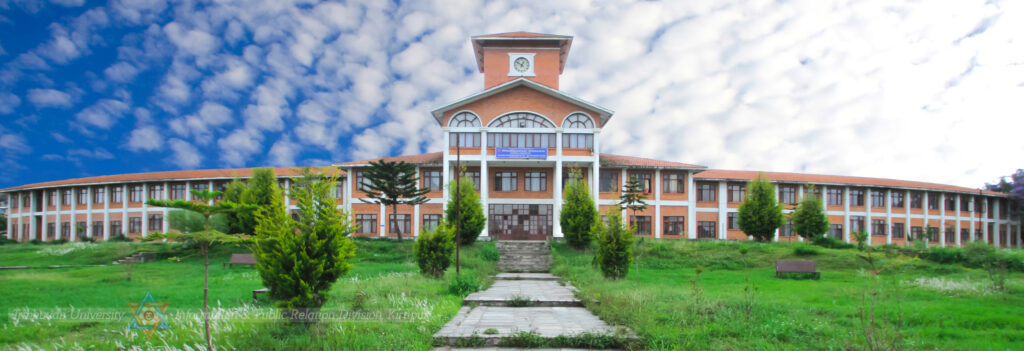

Tribhuvan University, the oldest and largest university in Nepal, offers over 1000 undergraduate and 500 postgraduate programs across various curricula. Established in 1959 B.S by the late king Tribhuvan, its main headquarters are located in Kritipur, Kathmandu. With 30 constituent campuses and over 600 affiliated colleges across the country, Tribhuvan University is the leading educational institute in Nepal and holds the world record for having the largest student body.
History
Tribhuvan University, named after the late King Tribhuvan, is the oldest and largest university in Nepal, established on 25 June 1959 (or 11 Ashar 2016 BS). Initially, all postgraduate classes were conducted at Tripureshwor Campus, along with the administrative office. However, in 1967, the university was relocated to Kirtipur, an ancient town situated about 5 km southwest of Kathmandu city.
With an area of 154.77 hectares, Tribhuvan University‘s Central Administrative Office and Central Campus make up the institution’s physical footprint.
Academics
Tribhuvan University, a state-owned institution, has expanded its programs since its establishment. It currently offers five technical institutes and four general faculties, with 115 courses for the technical proficiency certificate level, 1079 courses for Bachelor’s level, 1000 courses for Master’s level, and PhD degrees in the technical institutes and faculties.
Initially, the university only ran its programs through constituent campuses, but with the growing demand for higher education, private colleges were established in response. TU started providing affiliation to private colleges in 1979-1980, and as of April 2016, 1,084 private and public colleges were affiliated with TU.
In the 2014-2015 academic session, 405,341 students were enrolled in TU academic programs. Of these, 148,141 (36.55%) students study in its 60 constituent campuses, while 257,200 (63.45%) students study in 1,053 affiliated colleges.
Tribhuvan University employs a total of 15,254 people, including 7,841 teaching faculty and 7,413 non-teaching staff, including support staff in its constituent campuses.
Rankings
Tribhuvan University has received several rankings in various prestigious global and regional rankings. As per the Times Higher Education World University Rankings 2021, the university is ranked among the top 800-1000 universities in the world and among the 251-300 best universities of Asia. Additionally, according to the 4icu Organisation of University Ranking, the university is ranked at 6676 in the world and 2nd in the country. These rankings attest to the university’s commitment to providing quality education and research opportunities to its students.
Technical Institutes
Tribhuvan University oversees its science and technology programs, including BSc, BE, and MBBS, through its five technical institutes. Each institute focuses on a specific domain within the field of science and technology education, ensuring specialized and comprehensive learning opportunities for students. These institutes play a crucial role in the university’s mission to provide quality education and prepare graduates for successful careers in their chosen fields.
- Institute of Agriculture and Animal Science (IAAS)
- Institute of Medicine (IOM)
- Institute of Engineering (IOE)
- Institute of Science and Technology (IOST)
- Institute of Forestry (IOF)
Organization
Tribhuvan University is a government-funded institution but operates as an autonomous organization. Despite its government funding, the university is able to maintain its independence and make decisions regarding its operations and policies.
- Chancellor: Prime Minister of Nepal (Puspa Kamal Dahal ‘Prachanda”)
- Pro-Chancellor: Minister of Education (Shishir Khanal)
- Vice Chancellor: Prof. Dr. Dharma Kant Baskota
- Rector: Prof. Dr. Shiva Lal Bhusal
- Registrar: Prof. Dr. Peshal Dahal
Constituent Colleges
The following is a partial list of constituent colleges of Tribhuvan University on different Provience of Nepal
Province 1
- Mahendra Ratna Multiple Campus, [Ilam District|Ilam]
- Model Campus, Jhapa
- Mechi Multiple Campus, Jhapa
- Damak Multiple Campus, Jhapa
- Mahendra Morang Adarsh Multiple Campus, Biratnagar
- Snatakottar Campus(Postgraduate Campus), Biratnagar
- Nursing Campus, Biratnagar
- Purwanchal Campus, Dharan
- Mahendra Multiple Campus, Dharan
- Central Campus of Technology, Dharan[15]
- Dhankuta Multiple Campus, Dhankuta
- Tehrathum Multiple Campus, Chuhandanda, Terhathum
- Bhojpur Multiple Campus, Bhojpur
- Mahendra Bindeshwori Multiple Campus, Rajbiraj
- Panchthar Multiple Campus, (Panchthar)
- Pathari Multiple Campus, Pathari Shanishchare
Madhesh Province
- Dumarwana Multiple Campus, Dumarwana Bara
- Ramshwaroop Ramsagar Multiple Campus, Janakpur
- Thakur Ram Multiple Campus, Birgunj
- National Academy Campus, Birgunj
- SSYM Campus, Siraha
- Janajyoti Multiple Campus, Lalbandi Sarlahi
- Mahendra bindeshwori multiple campus Rajbiraj
Bagmati Province
- Hetauda Campus, Hetauda
- Kathmandu Shiksha Multiple Campus, Chandragiri municipality, Satungal
- Bhaktapur Multiple Campus, Bhaktapur
- Sanothimi Campus, Bhaktapur
- Patan Samyukta Campus, Patan Dhoka
- Pulchowk Campus, Pulchowk
- Nepal Commerce Campus, Min Bhawan
- Thapathali Campus, Thapathali
- Jana Prasashan Campus, Jamal
- University Campus, Kirtipur
- Mahendra Ratna Campus, Tahachal
- Ayurved Campus, Kirtipur
- Public Youth Campus, Dhobichaur
- Saraswoti Multiple Campus, Lainchaur
- Amrit Campus, Lainchaur
- Central Campus, Maharajgung
- Nursing Campus, Maharajgunj
- Lalitkala Campus, Bhotahiti
- Trichandra Multiple Campus, Ghantaghar
- Padmakanya Multiple Campus, Bagbazar
- Shanker Dev Campus, Putalisadak
- Ratna Rajya Lakshmi Campus, Pradarshani Marg, Kathmandu
- Nepal Law Campus, Pradarshani Marg
- Bishwa Bhasa Campus, Pradarshani Marg
- Birendra Multiple Campus, Chitwan
Gandaki Province
- Gorkha Campus, Gorkha
- Lamjung Campus, Sundarbazar
- Paschimanchal Campus, Pokhara
- Mirmee Multiple Campus, MirmeeMirmee Multiple Campus , Mirmee, Syangja
- Pokhara Nursing Campus, Pokhara
- Pokhara Campus, Pokhara
- Prithivi Narayan Campus, Pokhara
- Dhaulagiri Campus, Baglung
- Janapriya Multiple campus, Pokhara
Lumbini Province
- Tribhuvan Multiple Campus, Palpa
- Butwal Multiple Campus, Butwal
- Paklihawa Campus, Paklihawa
- Bhairahawa Multiple Campus, Bhairahawa
- Bhairahawa Namuna Campus, Bhairahawa
- Mahendra Multiple Campus, Dang
- Rapti Babai Campus, Tulsipur, Dang
- Mahendra Multiple Campus, Nepalgunj
- Siddhartha Campus, Kapilvastu
- Sworgadwari multiple campus Pyuthan
Karnali Province
- Surkhet Campus, Birendranagar
- Jumla Campus, Jumla
- Musikot Multiple Campus, Rukum
Sudurpaschim Province
- Doti Multiple Campus, Doti
- Dadeldhura Campus, Dadeldhura
- Siddhanath Science Campus, Mahendranagar
- Jagannath Multiple Campus, Baitadi
- Krishna Snatak Campus, Darchula
- Mahakali Multiple Campus, Kanchanpur
Research Centers
Tribhuvan University has several research centers that are dedicated to promoting academic research in various fields. These centers include the
- Centre for Economic Development and Administration (CEDA)
- Centre for Nepal and Asian Studies (CNAS), previously known as the Institute for Nepal and Asian Studies (INAS),
- Research Centre for Applied Science and Technology (RECAST),
- Research Centre for Educational Innovation and Development (CERID).
Council
Tribhuvan University operates through five decision-making bodies, each with specific responsibilities. The University Council is the supreme body that makes decisions on policies, budget, rules and regulations, and the formation of special committees and commissions. The Executive Council is responsible for implementing operational decisions, accepting donations to the university, making decisions on grants, affiliation to private campuses, and appointments of university officials.
The Academic Council makes decisions on policies and practices regarding curriculum, teaching, examinations, and research. The Research Coordination Council sets policies on TU research activities, approves guidelines for researchers, and coordinates the functions of university-level research organizations. Lastly, the Planning Council has an advisory role in preparing long- and short-term plans, developing annual programs, and evaluating program implementation.
2. Kathmandu University
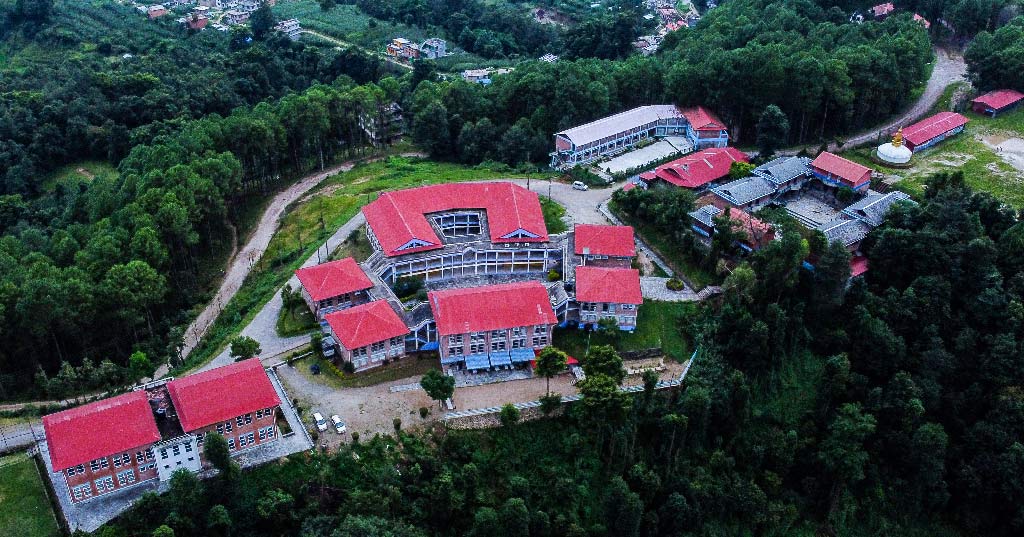

Kathmandu University is a public university located in Dhulikhel, Nepal. Established in 1991, it is the third oldest university in the country. The university operates through seven schools and has multiple campuses in Dhulikhel, Patan, Lalitpur, and Panchkhal. It offers undergraduate, graduate, and postgraduate courses in various fields with the motto “Quality Education for Leadership.”
History
Kathmandu Valley Campus, a private campus affiliated with Tribhuvan University, was founded in 1985 and offered Intermediate of Science courses. Later, the idea to create a university was approved by the Parliament and on 11 December 1991, it was established through an Act.
Academics
Academics at Kathmandu University cover a wide range of undergraduate to postgraduate programs in fields such as engineering, science, management, arts, education, law, and medical sciences.
The university offers various undergraduate courses in subjects like Engineering (Chemical, Civil, Computer, Electrical & Electronics, Mechanical, Environmental, Geomatics, Architecture), Science (Biotechnology, Computer Science, Environmental Science, Pharmacy, Human biology, Computational Mathematics & Applied physics), Management (Bachelors in Business Administration, executive MBA, Masters in Business Administration, etc.),
Arts (music, media, community development, fine art, and economics), and medical sciences (MBBS, MD/MS, MCH/DM in various medical specialties and sub-specialties, BSC Nursing, PCL Nursing, Bachelor in Nursing, BSC Midwifery, Bachelor in Physiotherapy, BDS).
The university also offers research facilities for visiting international scholars of Buddhism and Himalayan languages, in partnership with Rangjung Yeshe Institute, through the Centre for Buddhist Studies. Additionally, Kathmandu University owns Kathmandu University High School. The university has held four convocations so far, addressing the graduation of various Engineering graduates and other specialties.
Ranking
Kathmandu University is ranked among the top universities in Nepal and is highly regarded for its academic programs. However, it does not appear in any international university rankings such as the Times Higher Education World University Rankings or QS World University Rankings.
Program of KU
Business & economics
- Business & Management
- Accounting & Finance
- Economics & Econometrics
Engineering & technology
- Chemical Engineering
- General Engineering
- Electrical & Electronic Engineering
- Mechanical & Aerospace Engineering
- Civil Engineering
Social sciences
- Communication & Media Studies
- Politics & International Studies (incl Development Studies)
Arts & humanities
- Art, Performing Arts & Design
- Architecture
- Languages, Literature & Linguistics
- Physical sciences
- Geology, Environmental, Earth & Marine Sciences
- Mathematics & Statistics
- Physics & Astronomy
Clinical, pre-clinical & health
- Medicine & Dentistry
- Other Health
Life sciences
- Agriculture & Forestry
Computer science
Law
Education
Constituent Colleges
Kathmandu University provides education through seven schools:
- School of Arts (KUSOA)
- School of Education (KUSOED)
- School of Engineering (KUSOE)
- School of Law (KUSOL)
- School of Management (KUSOM)
- School of Medical Sciences (KUSMS)
- School of Science (KUSOS)
Kathmandu University has proposed the establishment of two new schools in Panchkhal Municipality, which include the School of Agriculture and the School of Forestry. Currently, the university has started temporary programs in Agriculture and Artificial Intelligence in Panchkhal until the establishment of KU-KUNJ.
The School of Medical Sciences (KUSMS) and the School of Engineering are the two largest schools in Kathmandu University in terms of student population. KUSMS was previously known as KUMS and was renamed in 2006 to reflect its expanded scope of training medical and paramedical graduates and postgraduates.
The School of Science and School of Engineering are located on the university campus, in contrast to other schools which have affiliated colleges throughout the country. The School of Engineering offers undergraduate and graduate courses in Electrical and Electronics, Mechanical, Computer, Civil, and Geomatics Engineering. Recently, it has also introduced Chemical Engineering and Bachelor of Architecture programs.
The School of Science offers classes in B.Sc. Human Biology, Environmental Science and Engineering, Bio-Technology, and Applied Physics. KU has recently added Chemical Engineering, BSc Nursing in Midwifery, and Bachelor in Physiotherapy to its list of courses, which are being offered to students in Nepal for the first time.
3. Pokhara University
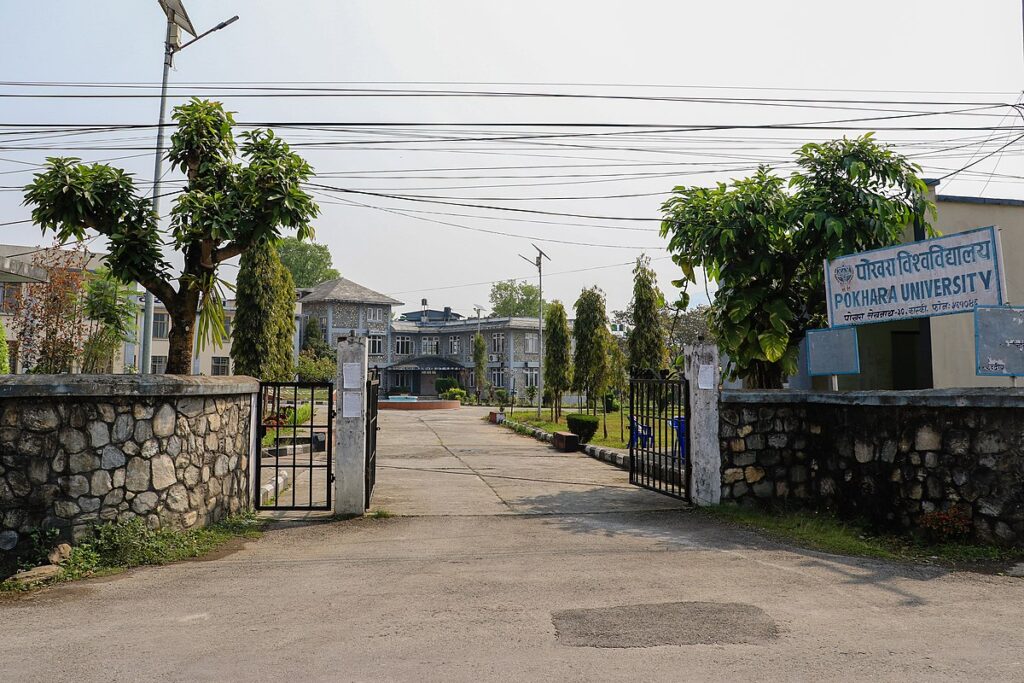

Pokhara University, also known as PU or PoU, was founded in 1997 and is the fifth university in Nepal. The university’s headquarters are located in Pokhara, Kaski District, Gandaki Province. It was established as part of a government initiative to increase access to higher education, along with Purbanchal University. The university is headed by the Prime Minister of Nepal as the chancellor, with the Minister of Education serving as the pro-chancellor, and the vice chancellor serving as the main administrator.
Academics
Pokhara University offers a range of degree programs through its four constituent schools and 57 affiliated academic institutions. These degree programs include Bachelor’s, Master’s, M.Phil., and PhD programs. The university began offering degrees after the enactment of the Pokhara University Act of 1997.
Ranking
Pokhara University is one of the leading universities in Nepal and has been making a significant contribution to the country’s education sector since its establishment in 1997. Over the years, it has become a popular destination for students seeking quality higher education. One important factor that students and parents consider when choosing a university is its ranking.
In 2020, the Nepal Institutional Ranking Framework (NIRF) ranked Pokhara University as the fifth-best university in Nepal based on several parameters, including teaching, learning and resources, research and professional practice, graduation outcomes, outreach and inclusivity, and perception.
Joint constituent colleges
- Madan Bhandari Memorial Academy Nepal, Urlabari, Morang (School Of Engineering)
- B.P. Koirala Memorial Cancer Hospital Nursing College, Chitwan, Nepal
- Himalaya Eye Institute, Kaski, Nepal
- Tilganga Institute of Ophthalmology, Kathmandu, Nepal
Constituent colleges
- School of Business
- School of Health and Allied Sciences (Formerly, School of Pharmaceutical and Biomedical Sciences)
- School of Engineering
- School of Development and Social Engineering
Engineering colleges
- School of Engineering, Dhungepatan, Kaski, Nepal
- Madan Bhandari Memorial Academy Nepal, Urlabari, Morang (School of Engineering)
- Nepal Engineering College, Bhaktapur, Nepal
- Nepal College of Information Technology, Lalitpur, Nepal
- Everest Engineering and Management College, Kathmandu, Nepal
- Cosmos College of Management and Technology, Lalitpur, Nepal
- Universal Engineering & Science College, Lalitpur, Nepal
- Gandaki College of Engineering and Science, Kaski, Nepal
- Pokhara Engineering College, Kaski, Nepal
- Oxford College of Engineering and Management, Nawalpur, Nepal
- United Technical College, Chitwan, Nepal
- Lumbini Engineering College, Rupandehi, Nepal
- Ritz College of Engineering & Management, Balkumari, Lalitpur
- National Academy of Science and Technology, Kailali, Nepal
- Rapti Engineering College, Dang, Nepal
- College of Engineering & Management, Banke, Nepal
Other affiliated colleges
- Excel Business College, Baneshwor Kathmandu
- United Technical College, Bhojad, Chitwan
- Victoria International College
- Rapti Engineering College, Ghorai, Dang
- Atharva Business College, Bansbari, Maharajgunj, Kathmandu,
- Pokhara University School of Engineering, Dhungepatan Kaski Nepal
- Shahid Ramnath Dahal Memorial College (MRM), Balaju, Kathmandu
- Ace Institute of Management (AIM), New Baneshwor, Kathmandu
- Apex College, Baneshwor, Kathmandu
- Brihaspati College, Siddharthanagar-5, Rupandehi
- College of Computer Technology, Devinagar, Butwal-13, Rupandehi
- Cosmos College of Management & Technology, Tutepani, Lalitpur
- Everest Engineering College (EEC), Sanepa, Lalitpur
- Nepal Engineering College (NEC), Changunarayan, Bhaktapur
- Oxford college of engineering and management, (OCEM) Gaidakot, Nawalparasi
- Gandaki College of Engineering and Science, Lamachour, Pokhara
- Institute of Advance Communication, Education & Research, Baneshwor, Ktm.
- Lumbini Engineering College, Butwal, Rupandehi.
- National Academy of Science & Technology, Dhangadhi
- National Open College (NOC) Sanepa, Lalitpur
- Nepal College of Computer Studies, Gaindakot-2, Nawalparasi
- Nepal College of Information Technology (NCIT), Balkumari, Lalitpur
- Nepal Engineering College (NEC), Changunarayan, Bhaktapur
- Nepal Tourism & Hotel Management College, Chinnedanda, Pokhara
- Nobel College, Sinamangal, Kathmandu
- Pokhara College of Management Studies, New Road, Pokhara
- Pokhara Engineering College (PEC) Phirke-8, Pokhara
- Pokhara College of Technology (currently known as LA GRANDEE International College (LGIC)), Simalchour-8, Pokhara
- School of Environmental Management & Sustainable Development (SchEMS) 62/38 Siddhicharan Marg Shantinagar, New Baneshwor
- Tilottama Campus Yogikuti, Butwal, Rupandehi
- South Asian Institute of Management (SAIM), Patan, Lalitpur
- Universal Science College (USC) Maitidevi, Kathmandu.
- V.S. Niketan College, Min Bhawan, Kathmandu
- Camad College, Sukedhara, Kathmandu
- Ritz College of Hospitality and Management, Balkumari, Lalitpur
- Nepal Western Management and Engineering College, Dhangadhi Kailali
- Boston International College, Bharatpur-9, Hakim Chowk, Chitwan
- Liberty College, Anamnagar, Kathmandu
- Citizen College, Kumaripati, Lalitpur
- Central COllege, Sinamgal, Kathmandu
4. Purbanchal University (PU)
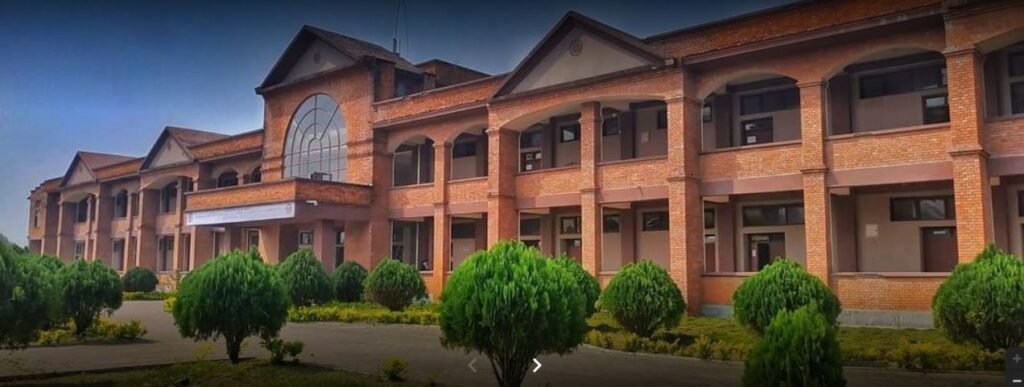

Purbanchal University (PU) is one of the prominent universities in Nepal, established in 1993 with the aim of advancing and transmitting knowledge in a conducive environment that promotes free inquiry and scholarly discourse. It is a public university situated in Koshi Province, Nepal, and has five constituent campuses and over 123 affiliated colleges.
The university has been providing quality education in various disciplines, including Engineering, medicine, management, humanities, and social sciences. PU offers undergraduate, graduate, and doctoral degree programs in several fields of study. The university’s main campus is located in Biratnagar, covering an area of 545 hectares.
PU’s dedication to providing excellent education has earned it a reputable rank in national and international rankings. The university has been ranked among the top 10 universities in Nepal by Webometrics and has also received recognition from the University Grants Commission. PU’s commitment to academic excellence and innovative teaching methodologies have made it a preferred destination for students seeking quality education in Nepal.
History
Purbanchal University (PU) is a public university in Koshi Province, Nepal. It was established in 1993 by the Government of Nepal with the goal of preserving, refining, inventing, adopting, extending, and transmitting knowledge in an environment that fosters free inquiry and open scholarly debate.
PU was established as a regional university to provide quality higher education to the people of eastern Nepal. It is one of the largest universities in the country with its main campus located in Biratnagar, Morang district. The university has been expanding steadily since its establishment and now has five constituent campuses and over 123 affiliated colleges across the eastern region of Nepal.
Academics
Purbanchal University offers a wide range of academic programs, including undergraduate, graduate, and post-graduate courses. The university’s academic offerings are organized into several faculties, including:
- Faculty of Science and Technology
- Faculty of Management
- Faculty of Humanities and Social Sciences
- Faculty of Law
- Faculty of Education
The Faculty of Science and Technology offers degree programs in subjects like Engineering, computer science, and biotechnology. The Faculty of Management provides courses in areas like accounting, finance, marketing, and human resource management. The Faculty of Humanities and Social Sciences offers programs in sociology, psychology, and journalism, among others.
Purbanchal University also has a Faculty of Law, which offers degree programs in law and legal studies. The Faculty of Education provides programs for students looking to pursue a career in teaching.
Apart from these faculties, Purbanchal University also offers programs in medicine, agriculture, and veterinary science through its constituent colleges. The university also has a Center for Postgraduate Studies, which offers advanced courses in various fields.
Ranking
Purbanchal University in Nepal is not ranked in international university rankings like QS World University Rankings, Times Higher Education World University Rankings, or Academic Ranking of World Universities (ARWU). However, the university is recognized by the University Grants Commission (UGC) of Nepal and has been accredited by the Accreditation Board for Engineering and Technology (ABET) for its Bachelor of Engineering programs. It is also a member of the Association of Commonwealth Universities (ACU).
Purbanchal University School of Engineering and Technology (PUSET)
The Purbanchal University School of Engineering and Technology (PUSET) is a constituent campus of Purbanchal University, established in 1999 in Biratnagar, Nepal. PUSET offers multidisciplinary undergraduate and graduate programs in information technology and engineering, including Bachelor of Computer Applications (BCA), Bachelor of Information Technology (BIT), Master of Computer Applications (MCA), and Bachelor of Engineering (BE) in Computer Engineering and Electronics & Communication.
PUSET has been a pioneer in offering IT-based curriculum in the Eastern Region of Nepal and has produced notable graduates working in top companies such as Facebook, Google, Alexa, and Wipro. The campus follows standard norms set by the Nepal Engineering Council for its Engineering programs.
Centre for Population and Development (CPAD)
Centre for Population and Development (CPAD)
Purbanchal University also has the Centre for Population and Development (CPAD), established in 2003, as a constituent body. CPAD fosters academic studies, research, and training in population and development in Nepal. It aims to bridge the gap between grassroots-based practical activities and academic exercises, offering a unique approach to population studies in Nepal.
5. Agriculture and Forestry University (AFU)
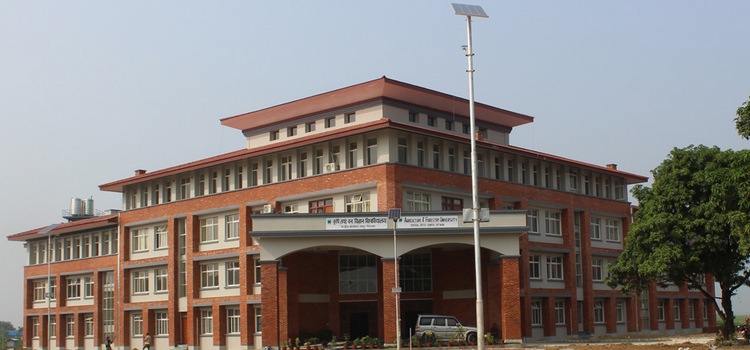

The Agriculture and Forestry University (AFU) was established in 2010 through a merger of two constituent campuses of Tribhuvan University in Nepal: the Rampur Agriculture Campus of the Institute of Agriculture and Animal Science and the Forestry Campus, Hetauda of the Institute of Forestry in Hetauda, Makwanpur. The university’s main campus is located in Rampur, Chitwan.
The primary objective of AFU is to produce skilled manpower in the agriculture and forestry sectors through high-quality education and research. The university offers undergraduate, graduate, and postgraduate degree programs in agriculture, forestry, and allied disciplines. AFU also conducts research and extension programs aimed at promoting sustainable agricultural and forestry practices.
The university has several constituent and affiliated colleges across Nepal, providing access to education and training in agriculture and forestry to students from all parts of the country. With a focus on practical training and fieldwork, AFU aims to produce graduates who can contribute to the development of the agricultural and forestry sectors in Nepal and beyond.
History
Agriculture and Forestry University (AFU) was established in June 2010 through a bill passed by the Nepalese Parliament, which authorized the creation of three new universities at campuses owned by Tribhuvan University. The Rampur Agriculture Campus, which was associated with the Institute of Agriculture and Animal Science, and the Forestry Campus, Hetauda, associated with the Institute of Forestry, were designated as the campuses for the new university. However, as of February 2015, Tribhuvan University refused to transfer ownership of the campuses to the new university, citing its autonomy from the Nepalese legislature.
In 2015, the first AFU affiliated college was established in Puranchaur V.D.C. of Kaski district, named the College of Natural Resource Management. The college initially offered a bachelor’s degree in agriculture and enrolled 50 students in its first batch.
Academics
The Agriculture and Forestry University (AFU) offers various programs such as undergraduate, graduate, and PhD programs in agricultural sciences from the Faculty of Agriculture and Faculty of Animal Sciences, Veterinary and Fisheries in Rampur, and undergraduate program in forestry from the Faculty of Forestry in Hetauda. The university has 140 faculty members at Rampur premises and 55 at the Faculty of Forestry, Hetauda. AFU has around 1500 undergraduate students, 200 postgraduate students, and around 50 PhD scholars in disciplines of agriculture and forestry.
The Rampur academic complex extends in an area of 280 hectares and the Hetauda Campus has an area of 95 hectares. Faculty members focus their research work on productivity of agricultural commodities, post-harvest technology, improving the shelf-life of food products, conserving biodiversity, and enhancing livelihood systems and innovation capacities of farming communities. The postgraduate students contribute thesis research to generate knowledge and technologies to address the issues of agriculture and forestry in the nation.
Campuses
- Faculty of Agriculture, Rampur, Chitwan
- Faculty of Animal Sciences, veterinary and Fisheries, Rampur, Chitwan
- Faculty of Forestry, Hetauda, Makawanpur
- College of Natural Resource Management, Puranchaur, Kaski
- College of Natural Resource Management, kapilakot, Sindhuli
- College of Natural Resource Management, Pakhribas, Dhankuta
- College of Natural Resource Management, Tikapur, Kailali
- College of Natural Resource Management, Bardibas, Mahottari
- College of Natural Resource Management, Katari, Udayapur
- College of Natural Resource Management, Madichaur, Rolpa
The University Complex of AFU and its Central Office, including the offices of the Vice-Chancellor and Registrar, are Located at Rampur, Chitwan.
6. Nepal Sanskrit University
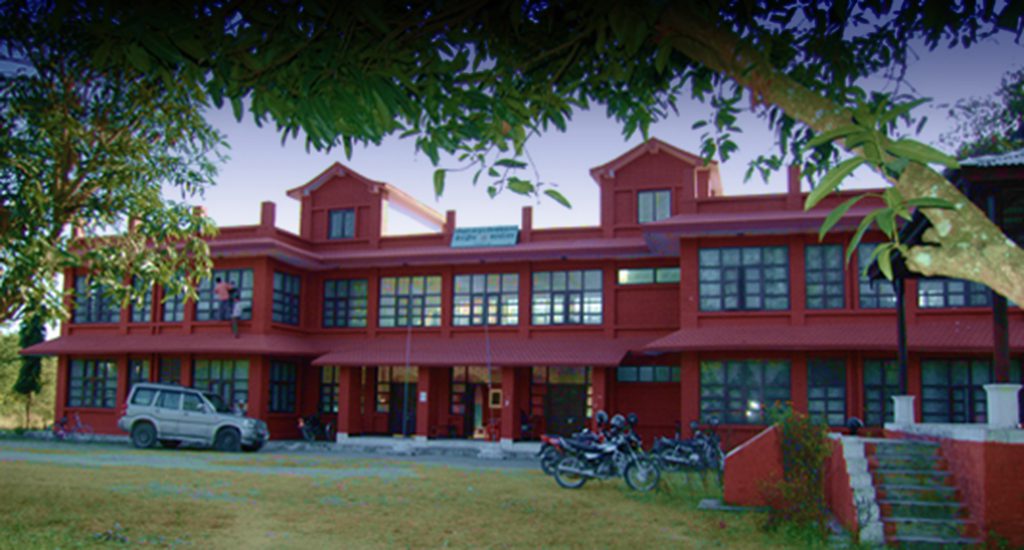

Nepal Sanskrit University, previously known as Mahendra Sanskrit University, was founded in December 1986. Its main campus is located in Beljhundi, which is situated in the Dang district of Lumbini Province, Nepal. The university is approximately 13 kilometers away from the city of Ghorahi.
History
Nepal Sanskrit University, formerly known as Mahendra Sanskrit University, was established in December 1986 with its central office located in Beljhundi of Dang district in Lumbini Province, Nepal. The university was founded with the aim of fulfilling the need for an autonomous institution for teaching and learning activities, and research in Sanskrit at various levels.
The university also aimed to systematize Sanskrit education up to the highest level in the country, preserve and promote Sanskrit education in various sectors of Nepalese society, and develop Nepal into a center for learning through Sanskrit education. The university offers degree and non-degree research programs based on Sanskrit and organizes training programs on Vedic and Buddhist teachings, as well as Yoga training. Currently, the university has 12 constituent and 13 affiliated Vidhyapeetha (campuses) throughout the country.
Academics
Nepal Sanskrit University, previously known as Mahendra Sanskrit University, was established in December 1986 in Beljhundi, Dang district of Lumbini Province, Nepal. The university offers Bachelor (Shastri), Bachelor of Education, Masters (Acharya) and Doctoral courses in classical and modern subjects. The university also offers Bachelors of Ayurvedic Medicine and Surgery (BAMS) and plans to start the Institute of Sthapatya (IOS) for condensed courses for Ayurvedacharya.
The university has 12 constituent and 13 affiliated Vidhyapeetha (Campuses) throughout Nepal. The main objectives of the university are to provide an autonomous institution for teaching/learning and research of Sanskrit at various levels, systematize Sanskrit education up to the highest level in Nepal, preserve and promote Sanskrit education in Nepalese society, and develop Nepal as a center for learning through Sanskrit education.
NSU provides degree and non-degree research opportunities based on Sanskrit and offers training programs on Vedic and Buddhist teachings and Yoga training.
Affiliated campuses
- Balmiki Vidyapith, Kathmandu
- Pindeshwor Vidyapeeth, Dharan, Sunsari
- Janata Vidyapith, Dang
- Bishow Bidhalaya Vidyapith, Beljhundi, Dang
- Central Ayurveda Vidyapith, Beljhundi, Dang
- Kalika Sanskrit Vidyapith, Nawalpur
- Harihar Sanskrit Vidyapith, Argakhanchi
- Sharada Vidyapith, Mahandranagar, Kanchanpur
- BPK Sanskrit Vidyapith, Solukhumbu
- Bhanu Sanskrit Vidyapith, Tanahun
- Vindabashini Vidyapith, Kaski
- Yjnayavalkya Lakshminarayan Vidyapeeth, Matihani, Mahottari
- RuRu Sanskrit Vidyapith, Gulmi
- Janakhajari Vidyapith, Janakpur, Dhanusha
- Radhadamodar Sanskrit Vidyapith, Syangja
7. Mid West University
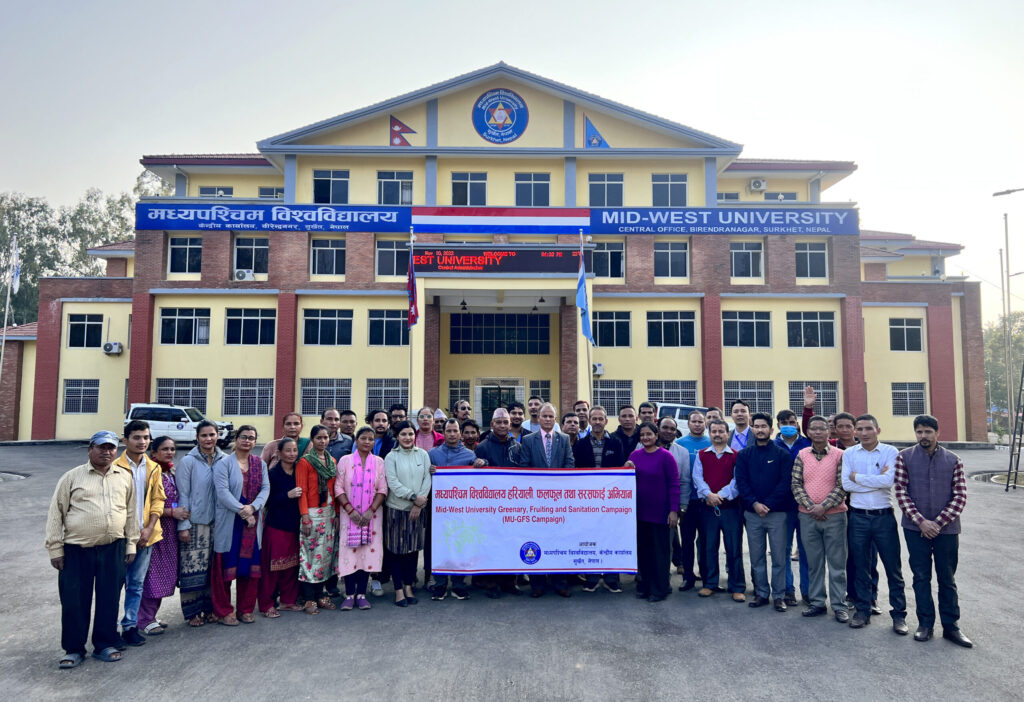

Mid-West University is a public higher education institution situated in the city of Birendranagar, Surkhet, which serves as the capital of the Karnali Province in Nepal. Formerly located in the Mid Western development region of Nepal, the university is now autonomous and provides a range of academic programs.
History
Mid-West University was founded on June 17, 2010, through a parliamentary act established by the Nepalese government. The university is part of a multi-university system and is supported by the state, with its campus and Central Executive Office situated on land donated by the Nepalese government. The university is located in Birendranagar, which is in the Surkhet district of Nepal.
Academics
Mid-West University offers a wide range of academic programs across various fields of study. These include undergraduate, graduate, and postgraduate degrees in fields such as education, management, science, and humanities. The university also offers programs in medicine, Engineering, and law. Additionally, the university provides research opportunities for its students and faculty, with a focus on addressing the developmental challenges of Nepal and the wider region. Mid-West University is committed to providing a high-quality education that prepares its students to become competent and responsible members of society.
Faculties
- Faculty of Engineering
- Faculty of Management
- Faculty of Science and Technology
- Faculty of Education
- Faculty of Humanities and Social Sciences
- Faculty of Agriculture and Forestry Sciences
- Faculty of Health Sciences
8. Lumbini Buddhist University
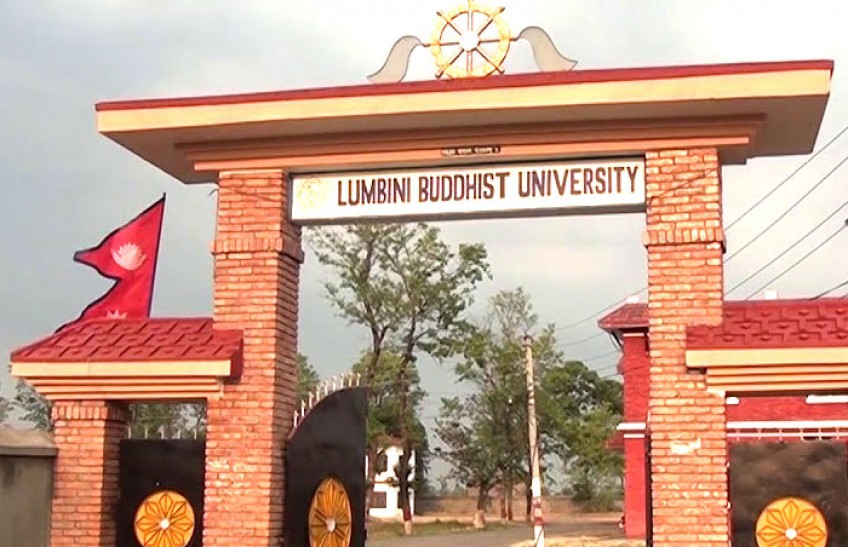

Lumbini Buddhist University is a renowned tertiary educational institution situated in Lumbini, Nepal, which is considered the birthplace of the Buddha. The university was first conceptualized at the First World Buddhist Summit held in Lumbini in 1998 and officially established on June 17, 2004. Its legal status was confirmed by the Lumbini Buddhist University Act, which was promulgated on November 10, 2006. The government of Nepal provides financial support to the university. Lumbini Buddhist University offers a variety of academic programs, including a four-year Bachelor’s degree in Buddhism, as well as Master’s and PhD programs. The university’s academic offerings are designed to provide students with a comprehensive understanding of Buddhist philosophy and teachings.
History
Lumbini Buddhist University was established in 2004 in Lumbini, Nepal, the birthplace of the Buddha. The university was inspired by the idea of creating a tertiary educational institution dedicated to promoting and preserving Buddhist culture and heritage. The concept for the university was first introduced at the First World Buddhist Summit held in Lumbini in 1998, and after several years of planning, it was officially formed on June 17, 2004.
The Lumbini Buddhist University Act, which was promulgated on November 10, 2006, confirmed the legal status of the university and provided it with financial assistance from the government of Nepal. The university’s academic programs are focused on providing students with a deep understanding of Buddhist philosophy, history, and culture, and preparing them for leadership roles in the fields of education, research, and social service.
Academics
Lumbini Buddhist University offers a variety of academic programs that are designed to promote and preserve Buddhist heritage and culture. The university provides undergraduate, graduate, and postgraduate courses in Buddhist studies, philosophy, and culture. The four-year Bachelor’s program in Buddhism is the flagship program of the university, while the Master’s and PhD programs provide opportunities for advanced study and research. The university also offers certificate courses in Buddhist languages and culture.
The academic programs at Lumbini Buddhist University are aimed at providing students with a comprehensive understanding of Buddhist philosophy, history, and culture, as well as preparing them for leadership roles in education, research, and social service. The university has a strong research focus and encourages students and faculty to undertake research projects that contribute to the development of Buddhist studies and philosophy.
Affiliated colleges
- Buddha Multiple Campus
- Jiri Buddhist College
- Lotus Buddhist Academic College, Lalitpur
- Lumbini International Academy of Science and Technology
- Lumbini Academic College of Buddhism and Himalayan Studies
- Sowa Rigpa International College
- Sugat Baudha Mahavidyalaya
- Theravada Buddhist Academy
- Tulsipur Metro College (Local Level Government: Tulsipur Metropolis)
9. Far Western University
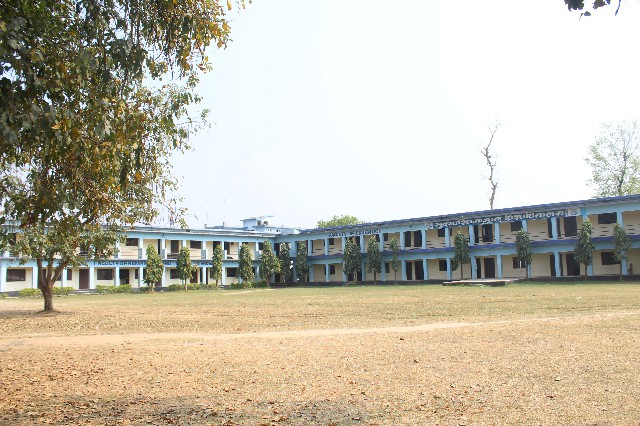

Far Western University is a prestigious university located in Mahendranagar, Kanchanpur, Nepal. It was established in August 2010 (2067 BS) by the Constituent Assembly Act of the Government of Nepal. The university officially began operations in 2011, following the appointment of its officials. The university is unique in that the Prime Minister of Nepal serves as its Chancellor. Far Western University offers undergraduate, graduate, and postgraduate courses in a variety of fields, including education, management, humanities, and science.
The university’s academic programs are designed to provide students with the knowledge and skills they need to succeed in their chosen fields and become productive members of society. Far Western University is committed to providing quality education and promoting research and innovation to address the social, cultural, and economic challenges faced by Nepal and the region.
History
Far Western University was established in August 2010 (2067 BS) by the Constituent Assembly Act of the Government of Nepal. The university was created to provide higher education opportunities to the people of the far-western region of Nepal, which had previously been underserved in terms of higher education. The university came into operation in 2011, after the appointment of its officials. It was the first university in Nepal to be established by the Constituent Assembly. The Prime Minister of Nepal serves as the Chancellor of the university, providing an important link between the government and the academic community.
Academic
Far Western University offers a wide range of academic programs at the undergraduate, graduate, and postgraduate levels in various fields such as education, management, humanities, and science. The university has a strong commitment to providing quality education that is accessible and affordable to students from diverse backgrounds. The academic programs at Far Western University are designed to provide students with a comprehensive understanding of their chosen field and the practical skills they need to succeed in their careers.
The university places great emphasis on research and innovation, and encourages students and faculty to undertake research projects that contribute to the development of knowledge and understanding in their respective fields. Far Western University is dedicated to producing graduates who are equipped with the knowledge and skills to address the social, cultural, and economic challenges facing Nepal and the region. With a focus on quality education and research, Far Western University has emerged as a leading institution of higher learning in Nepal.
Faculties and programmes
- Faculty of Agriculture Science (B.Sc. Ag)
- Faculty of Management (BBA, BBS, MBA)
- Faculty of Education (B.Ed., M.Phil)
- Faculty of Humanities and Social Sciences ( BA, BSW)
- Faculty of Science and Technology (B.Sc., B Ed.CSIT, B.Sc. CSIT)
- Faculty of Law (BA LLB)
- Faculty of Engineering (BE Civil, BE Computer, BE Architecture (Proposed), ME Structural Engineering (Proposed))







